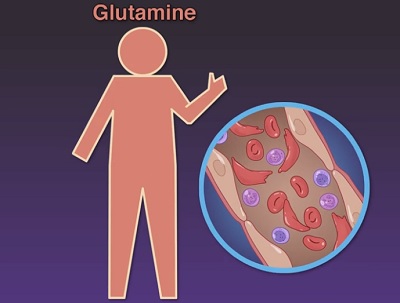
Graphic courtesy of New England Journal of Medicine.
Patients with sickle cell disease taking L-Glutamine had fewer pain attacks, suffered fewer acute chest syndrome, had fewer hospital stays, and, if admitted, stayed fewer days, the latter a rather significant finding because "this patient group is often in and out of hospital," said Wayne State University School of Medicine Professor of Pediatrics Sharada Sarnaik, M.D.
A team led by Dr. Sarnaik, a hematologist/oncologist at the School of Medicine, contributed to the study, "A Phase 3 Trial of L-Glutamine in Sickle Cell Disease," published last month in the New England Journal of Medicine. The study showed that the drug had very few side effects for patients.
Previously, hydroxyurea, a chemotherapy that can also treat leukemia and head and neck cancer, was the only other preventive drug available to sickle cell patients. L-Glutamine is an oral therapy from Emmaus Medical. The U.S. Food and Drug Administration has granted approval of the latter as a prescription drug to reduce the rate of acute complications of sickle cell disease among adults and children 5 years and older on the basis of the study results.
"The study adds one additional drug to be used for this disease, and we are pleased that we were part of it," she said.
Nationally, 232 patients ranging from 5 to 58 years old participated in the 48-week multi-center, randomized, placebo-controlled double-blind study in 31 cities. Clinicians tested the efficacy of pharmaceutical grade L-Glutamine administered twice daily by mouth, as compared with a placebo.
The Michigan site, led by Dr. Sarnaik at Children's Hospital of Michigan, included three patients, who were all younger than 18.
She said Wayne State University was selected by the makers of the medication to participate in the clinical trial.
"I believe that we were chosen because of our sickle cell program's experience and track record of completing a number of research studies, with cooperation of both the hospital and the university," she said. "The patients we had did very well on the one-year study, missed very few, if any visits during their participation."
The clinical trial was supported by Emmaus Medical.